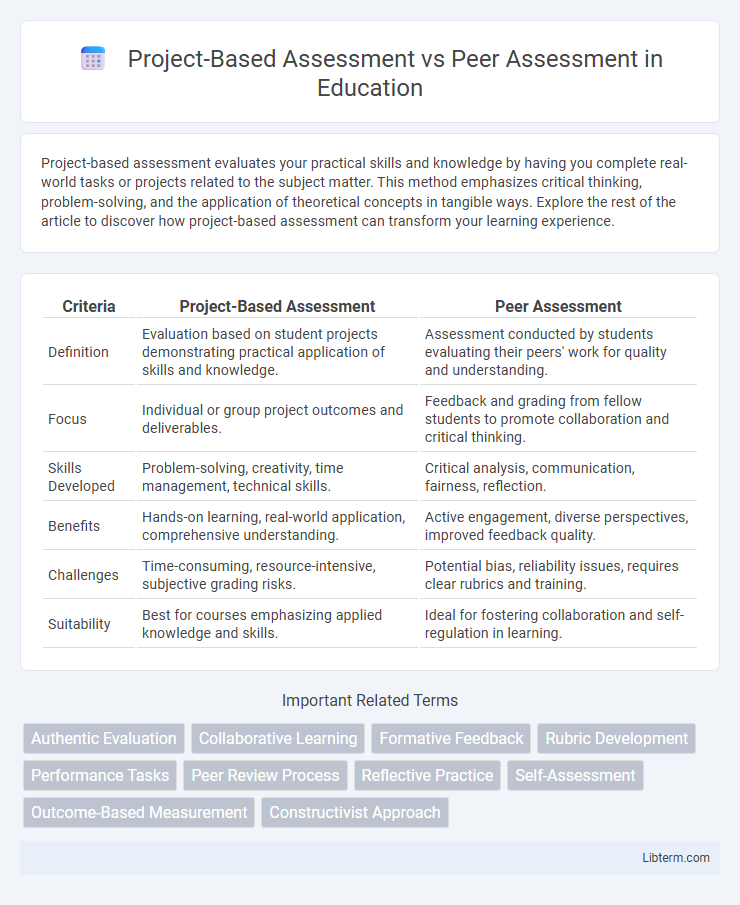Project-based assessment evaluates your practical skills and knowledge by having you complete real-world tasks or projects related to the subject matter. This method emphasizes critical thinking, problem-solving, and the application of theoretical concepts in tangible ways. Explore the rest of the article to discover how project-based assessment can transform your learning experience.
Table of Comparison
| Criteria | Project-Based Assessment | Peer Assessment |
|---|---|---|
| Definition | Evaluation based on student projects demonstrating practical application of skills and knowledge. | Assessment conducted by students evaluating their peers' work for quality and understanding. |
| Focus | Individual or group project outcomes and deliverables. | Feedback and grading from fellow students to promote collaboration and critical thinking. |
| Skills Developed | Problem-solving, creativity, time management, technical skills. | Critical analysis, communication, fairness, reflection. |
| Benefits | Hands-on learning, real-world application, comprehensive understanding. | Active engagement, diverse perspectives, improved feedback quality. |
| Challenges | Time-consuming, resource-intensive, subjective grading risks. | Potential bias, reliability issues, requires clear rubrics and training. |
| Suitability | Best for courses emphasizing applied knowledge and skills. | Ideal for fostering collaboration and self-regulation in learning. |
Introduction to Assessment Methods
Project-Based Assessment emphasizes evaluating students through real-world tasks and practical application of knowledge, fostering critical thinking and problem-solving skills. Peer Assessment involves students reviewing each other's work, promoting collaborative learning and self-reflection. Both methods enhance active engagement, but Project-Based Assessment prioritizes individual creativity, while Peer Assessment focuses on collective feedback and learning.
Understanding Project-Based Assessment
Project-Based Assessment evaluates student learning through the completion of complex, real-world projects that demonstrate practical application of knowledge and skills. This method emphasizes critical thinking, creativity, and problem-solving by requiring students to present tangible outcomes, such as reports, prototypes, or presentations. In contrast to Peer Assessment, Project-Based Assessment focuses more on individual accountability and in-depth comprehension within authentic contexts.
Understanding Peer Assessment
Peer assessment enhances learning by encouraging students to critically evaluate each other's work, promoting deeper understanding of project criteria and standards. It fosters collaborative skills and provides diverse feedback, helping learners identify strengths and areas for improvement that might be overlooked by instructors alone. By engaging in peer review, students develop metacognitive abilities crucial for self-regulation and academic success in project-based settings.
Key Differences Between Project-Based and Peer Assessment
Project-Based Assessment evaluates a learner's ability to apply knowledge and skills by completing real-world tasks or projects that demonstrate understanding and problem-solving. Peer Assessment involves learners evaluating each other's work, promoting critical thinking, feedback skills, and collaborative learning. The key difference lies in Project-Based Assessment focusing on individual or group task outcomes, while Peer Assessment prioritizes the evaluation process and peer feedback quality.
Benefits of Project-Based Assessment
Project-Based Assessment enhances critical thinking and practical application by engaging students in real-world tasks that demonstrate mastery of subject matter. This method promotes deeper understanding and retention of knowledge through hands-on experience and collaborative problem-solving. It also allows educators to evaluate a broad range of skills including creativity, communication, and project management, which are essential for career readiness.
Advantages of Peer Assessment
Peer assessment enhances critical thinking and self-reflection by engaging students in evaluating their peers' work, promoting deeper understanding of the subject matter. It facilitates collaborative learning and improves communication skills, creating a more interactive and supportive educational environment. This method also provides diverse feedback perspectives, enabling students to identify strengths and areas for improvement beyond instructor evaluations.
Challenges in Implementing Project-Based Assessment
Implementing project-based assessment faces challenges such as ensuring consistent and objective grading due to the subjective nature of evaluating complex projects. Coordinating group work and managing unequal participation among students often complicates the assessment process. Time constraints for both instructors and students further limit thorough feedback and detailed evaluation of individual contributions.
Limitations of Peer Assessment
Peer assessment often suffers from biases due to varying levels of expertise and subjective judgments, which can undermine the reliability and validity of the evaluation. Students may lack the necessary skills to provide constructive and accurate feedback, resulting in inconsistent grading standards. Furthermore, peer assessments can be influenced by social dynamics, such as friendship or rivalry, leading to potential unfairness in scoring.
Choosing the Right Assessment Strategy
Project-based assessment evaluates students' understanding through hands-on, real-world tasks that demonstrate applied knowledge and critical thinking skills. Peer assessment encourages collaborative learning by involving students in evaluating each other's work, fostering reflection and communication abilities. Choosing the right assessment strategy depends on learning objectives, with project-based assessments suited for skill demonstration and peer assessments effective for promoting engagement and self-regulation.
Conclusion: Optimizing Student Learning Through Assessment
Project-Based Assessment and Peer Assessment both enhance student learning by fostering critical thinking and collaboration skills. Combining authentic, real-world problem solving with peer feedback maximizes engagement and deepens understanding, leading to improved academic outcomes. Integrating these methods creates a dynamic learning environment that supports continuous improvement and student ownership of learning.
Project-Based Assessment Infographic

 libterm.com
libterm.com